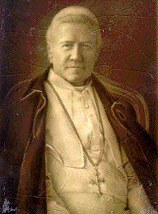July 3: Churches v. Scholarship
Lamentabili sane (1907):
Churches v. Scholarship
It was on this date, July 3, 1907, that Pope Pius X, in his encyclical Lamentabili sane, formally condemned the "Modernist" intellectual movement of scholarship in the Catholic Church. What Pius did was create a syllabus of 65 errors that the more "liberal" — that is to say, the more truthful — scholars must not hold under pain of excommunication.
Pius gets to the heart of the matter from his first words:
With truly lamentable results, our age, casting aside all restraint in its search for the ultimate causes of things, frequently pursues novelties so ardently that it rejects the legacy of the human race. ... The fact that many Catholic writers also go beyond the limits determined by the Fathers and the Church herself is extremely regrettable.
What was Pius condemning? Only the very depth of scholarship that his predecessor Leo XIII had encouraged, and with profoundly positive results. And what did Pius think so regrettable?
To understand how this anti-modernist blast from a medieval horn was possible on the cusp of a new, progressive, socially aware century, you have to know a little about Pius X. Giuseppe Melchiorre Sarto was born on 2 June 1835 in Venice. An "ignorant and stubborn Italian peasant," he excelled in religious studies and eventually, at the age of 58, was made a cardinal by Pope Leo XIII (1893). Ten years later, on Leo's death in 1903, the peasant was elected pope. His lifelong concern was "the purity of the faith." Pius "pointed out the dangers of certain new theological methods, ... based upon Agnosticism" which could lead to "subversive criticism of the Holy Scriptures and of the origins of Christianity."
And so we get a list of "errors" such as,
5. ... the Church has no right to pass judgment on the assertions of the human sciences.
15. Until the time the canon was defined and constituted, the Gospels were increased by additions and corrections. ...
52. It was far from the mind of Christ to found a Church...
56. The Roman Church became the head of all the churches, not through the ordinance of Divine Providence, but merely through political conditions.
57. The Church has shown that she is hostile to the progress of the natural and theological sciences.
Each one of these "errors" has been proven quite true by scholars, including Catholic scholars.
Instead of a beaver hat, Pius donned a dunce cap. As Joseph McCabe acerbically summarizes,
His one achievement was to drive out of the Church what was left of Catholic scholarship. He had a type of mind like that of the Irishman who, when asked if he really believed that the whale swallowed Jonah, said: "Faith, I'd believe that he swallowed the whale if the Church told me to." Pius soon cleansed Rome of the scholars and liberals whom Leo had attracted to it in his later and more serious years. He set up Inquisition Committees throughout the Church, to watch all scholars, lay and clerical. It was unsafe to express a doubt whether Moses had really written the description of his own funeral in the Pentateuch. And when the poor man had purified his Church of all honest and outspoken scholars, he struck a medal in honour of his victory.*
What Pius accomplished with his 1907 encyclical, was not only to drive out of the Church all honest Catholics of learning. He also established a "Committee of Vigilance" to monitor any Catholic contemplating Modernism in relation to Church philosophy, apologetics, exegesis, history, liturgy, or discipline. It is a fact of any organization that, once it becomes powerful enough, it cares more for self-preservation than for its original purpose. That truth and the common welfare suffer as a consequence is "extremely regrettable."
* Joseph McCabe, The Popes and Their Church, 1918, I, Chapter 7.
Originally published July 2003 by Ronald Bruce Meyer.


